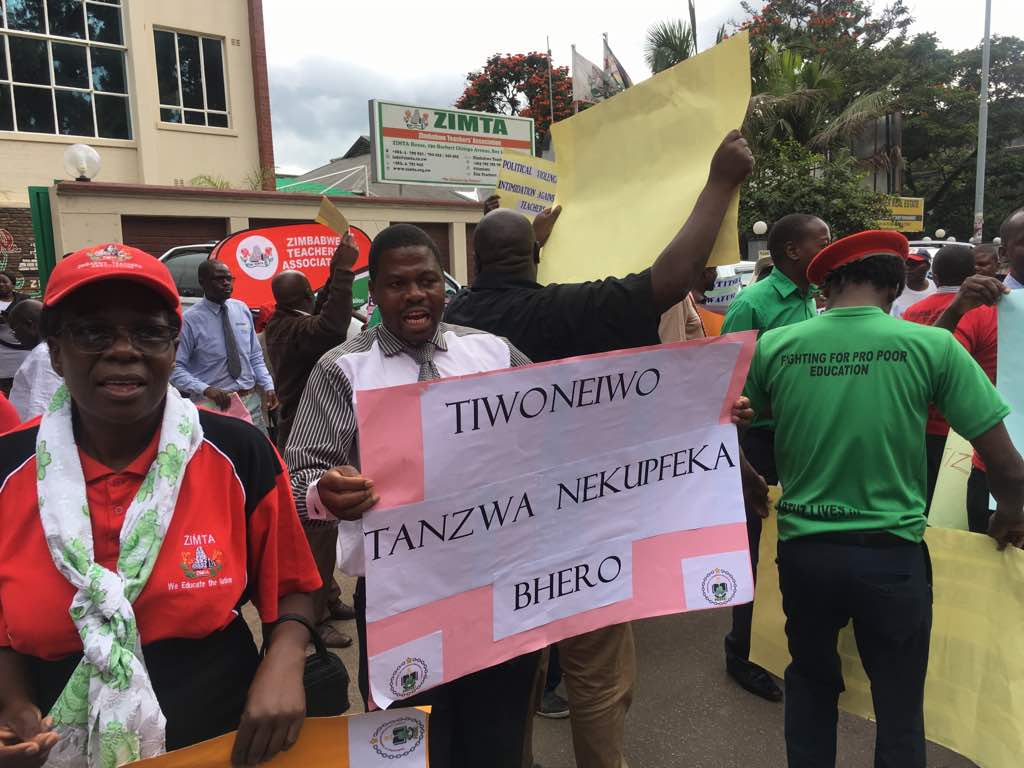
By Tatenda Chitagu/Nqobani Ndlovu
THE Amalgamated Rural Teachers’ Union in Zimbabwe (Artuz) has said the ongoing strike by educators is a genuine labour dispute and apolitical.But President Emmerson Mnangagwa’s spokesperson, George Charamba claimed that the United States embassy was behind the teachers’ industrial action which has scuttled preparations for final examinations due in December this year.
The majority of teachers have not reported for duty since last week, protesting poor salaries.
Teachers have vowed not to report for duty until the government accedes to their demand for a US$520 monthly salary and provision of COVID-19 protective clothing.
Charamba on Tuesday, using the sobriquet @Jamwanda2, tweeted: “When you reread this tweet from the US ambassador barely a week ago after his meeting with (Labour minister Paul) Professor Mavima, and relate it to the blatantly political actions and communications of a certain segment of teachers’ unions, is the connection not obvious? Kana vada hondo, tinoitambira (If they want war, we are ready for it). The US ambassador can only mislead them, nothing more!”
Charamba was responding to an earlier tweet by US ambassador to Zimbabwe, Brian Nichols where the diplomat said he had met with Mavima and urged government to negotiate with the teachers in good faith.
The US embassy has denied reports of interfering in Zimbabwe’s internal affairs.
Charamba added: “You like political rivals and the consequences of that are everywhere for clever people to read! Don’t spoil a good, credible case, or the cause of bona fide teachers who wish for a solution. Just a bit of advice! This government employs teachers, not agitators!” he said.
- Chamisa under fire over US$120K donation
- Mavhunga puts DeMbare into Chibuku quarterfinals
- Pension funds bet on Cabora Bassa oilfields
- Councils defy govt fire tender directive
Keep Reading
Yesterday, Artuz said the teachers’ grievances were genuine and accused Charamba of merely looking for a scapegoat.
“We note with concern threats issued by the President’s spokesperson George Charamba threatening war against teachers. Professor Mavima earlier on accused our union of being political and being funded by international capital. Mavima also accused us of working with the South African Communist Party.
“We don’t have intentions to go to war with the incumbent government. We demand a living wage. We will defend our labour rights through constitutional means. We won’t be silenced by the ruling elites who are living in luxury when workers are starving.
“We have every right to reach out to unions across the globe and the working class seeking solidarity at a time when labour rights have been withdrawn by the government. These threats and accusations will not resolve the ensuing labour dispute. Government should restore the value of our salaries,” Artuz said. Zimbabwe Teachers’ Association (Zimta) yesterday insisted that teachers were incapacitated to return to work. “Because teachers have been subsidising the employer for too long, their failure to attend to their daily duties has not been surprising for many. It is now in the employers’ best interest to source funding and pay teachers decent salaries denominated in United States dollars,” Zimta said in a statement.
“While teachers across the world are taking charge and leading in a period of the COVID-19 crisis, the Zimbabwean teacher has been made irrelevant due to incapacitation and poor salaries that no longer sustain the desire or motivate them to work.”
Meanwhile, the United Nations Children’s Emergency Fund (Unicef) has warned of far-reaching implications on the academic growth of children owing to COVID-19-induced challenges facing the education sector.
“The prolonged school closures are likely to have a major and negative effect on children’s learning, physical, social and mental health and wellbeing threatening hard-won educational achievements for years to come,” Unicef said in a report.
“Prolonged school closures will likely exacerbate existing vulnerabilities and inequalities among children, especially girls, children with disabilities, those in rural areas, orphans and vulnerable children, as well as those from poor households and fragile families.”











